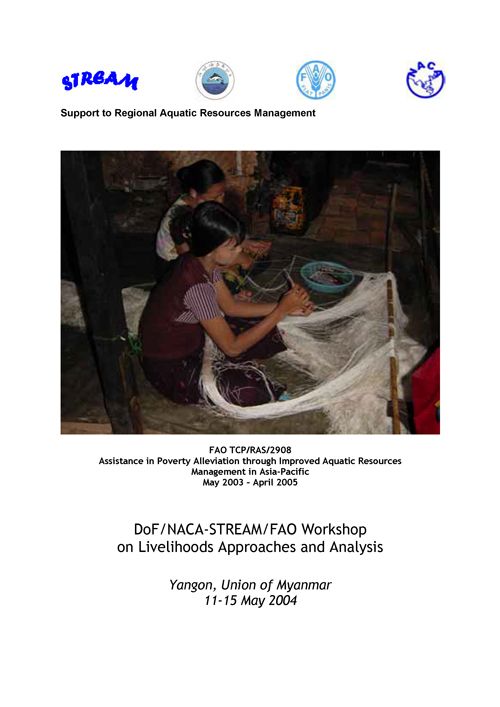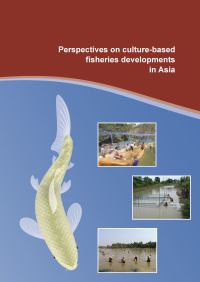Workshop on Livelihoods Approaches and Analysis, 11-15 May 2004, Myanmar
24 June 2004 | 927 Downloads | .pdf | 1023.09 KB | Gender, Livelihoods, gender and social issues, Myanmar
This is the report of the “DoF/NACA-STREAM/FAO Workshop on Livelihoods Approaches and Analysis” that was conducted in Yangon, Union of Myanmar from 11-15 May 2004. The purpose of the workshop was to develop and document mechanisms for training in livelihoods approaches and analysis, and to build national capacity to conduct livelihoods studies. The workshop in Yangon was the first STREAM event in Myanmar, with colleagues coming to participate from Yangon and many Divisions and States throughout the country. The workshop in Yangon was the fourth in a series, the first of which was held in Iloilo City, Philippines, in November 2003, the second in Ranchi, India, in February 2004, and the third in Vientiane, Lao PDR in March 2004. A subsequent workshop will take place in Yunnan, China.
The objectives of the workshop were to:
- Understand issues of interest to people whose livelihoods include aquatic resources management, especially those with limited resources.
- Build “(national) livelihoods teams” to do livelihoods analyses and training, and share their experiences with communities and other stakeholders.
- Share understandings of livelihoods approaches and analysis using participatory methods.
- Review current NACA-STREAM livelihoods analysis documentation, adapt and supplement, towards the drafting of a Guide for Livelihoods Analysis.
- Experience the use of participatory tools for livelihoods analysis.
- Plan activities for carrying out livelihoods analyses.
- Consider how to build capacity in monitoring and evaluation (M&E) and “significant change”.
The week was spent exploring the complex nature of communities and groups with whom we work and sharing understandings about how best to learn about their livelihoods. Additionally, adaptations of the tools for learning and communicating about livelihoods – first developed in the “SPARK-STREAM Languages and Livelihoods Workshops” were used to help participants understand livelihoods analysis processes.
A central element of the workshop was a visit to the community of Chaung Wa Village, where participants carried out activities to learn about the community’s livelihoods. In addition to gaining information about the Chaung Wa Village community itself, participants also gained important insights into how best to conduct livelihoods studies. One of the main outputs from the first, second and third workshops in the Philippines, India (with Nepal) and Lao PDR was a draft outline for a Guide for Livelihoods Analysis, which was modified following the Myanmar workshop and will continue to evolve through the series of “Workshops on Livelihoods Approaches and Analysis” throughout the region. The lessons learnt from the community visit to Chaung Wa Village will also feed into the drafting of this Guide. Additionally, workshop participants drew on their experiences of the workshop activities to consider what kind of Guide should be developed and what further actions should be taken.
Follow-up actions from this workshop include the dissemination of information about livelihoods analysis and approaches in Myanmar and continued work on the draft Guide for Livelihoods Analysis.
Creative Commons Attribution.

